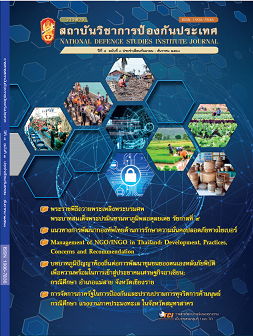กลยุทธ์ในการพัฒนาปัจจัยที่มีอิทธิพลต่อองค์การแห่งการเรียนรู้ของสถาบันอุดมศึกษาสังกัดกระทรวงกลาโหม The Strategies for Developing of Factors Influencing Learning Organization of Higher Education Institutions under the Ministry of Defence
Main Article Content
Abstract
บทคัดย่อ
การวิจัยครั้งนี้มีวัตถุประสงค์เพื่อ 1) ศึกษาสภาพการเป็นองค์การแห่งการเรียนรู้ของสถาบันอุดมศึกษาสังกัดกระทรวงกลาโหม 2) ศึกษาปัจจัยที่เกี่ยวข้องกับการเป็นองค์การแห่งการเรียนรู้ของสถาบันอุดมศึกษาสังกัดกระทรวงกลาโหม 3) ศึกษาปัจจัยที่มีอิทธิพลต่อการเป็นองค์การแห่งการเรียนรู้ของสถาบันอุดมศึกษาสังกัดกระทรวงกลาโหม และ4) เสนอกลยุทธ์ในการพัฒนาปัจจัยที่มีอิทธิพลต่อการเป็นองค์การแห่งการเรียนรู้ของสถาบันอุดมศึกษาสังกัดกระทรวงกลาโหม วิธีดำเนินการวิจัยประกอบด้วย
2 ขั้นตอน ขั้นตอนที่ 1 แบ่งเป็น 3 ระยะ คือ ระยะที่ 1 ศึกษาสภาพการเป็นองค์การแห่งการเรียนรู้ของสถาบันอุดมศึกษาสังกัดกระทรวงกลาโหม ระยะที่ 2 ศึกษาปัจจัยที่เกี่ยวข้องกับการเป็นองค์การแห่งการเรียนรู้ของสถาบันอุดมศึกษาสังกัดกระทรวงกลาโหม ระยะที่ 3 ศึกษาปัจจัยที่มีอิทธิพลต่อการเป็นองค์การแห่งการเรียนรู้ของสถาบันอุดมศึกษาสังกัดกระทรวงกลาโหม กลุ่มตัวอย่าง ผู้ให้ข้อมูลเชิงคุณภาพ คือ ผู้ทรงคุณวุฒิจำนวน 11 คน เครื่องมือที่ใช้เป็นแบบสัมภาษณ์ วิเคราะห์ข้อมูลโดยการวิเคราะห์เนื้อหา ผู้ให้ข้อมูลเชิงปริมาณ ได้แก่ ผู้บริหารอาจารย์ และเจ้าหน้าที่ฝ่ายอำนวยการจากโรงเรียนนายร้อยพระจุลจอมเกล้า โรงเรียนนายเรือ และโรงเรียนนายเรืออากาศนวมินทกษัตริยาธิราช จำนวน 242 คน ได้มาจากการสุ่มแบบแบ่งชั้น เครื่องมือที่ใช้เป็นแบบสอบถามมีค่าความเที่ยงเท่ากับ.92 และวิเคราะห์ข้อมูลโดยใช้ค่าความถี่ ร้อยละ ค่าเฉลี่ย ส่วนเบี่ยงเบนมาตรฐาน และการวิเคราะห์องค์ประกอบเชิงยืนยัน และขั้นตอนที่ 2 เสนอกลยุทธ์ในการพัฒนาปัจจัยที่มีอิทธิพลต่อการเป็นองค์การแห่งการเรียนรู้ของสถาบันอุดมศึกษาสังกัดกระทรวงกลาโหมจากการสนทนากลุ่มผู้เชี่ยวชาญจำนวน 11 คน เครื่องมือที่ใช้เป็นแบบบันทึกสนทนากลุ่ม วิเคราะห์ข้อมูลโดยการวิเคราะห์เนื้อหา
ผลการวิจัยพบว่า 1) สภาพการเป็นองค์การแห่งการเรียนรู้ของสถาบันอุดมศึกษาสังกัดกระทรวงกลาโหมมีองค์ประกอบสำคัญเรียงตามลำดับดังนี้ การเรียนรู้ การจัดการความรู้ องค์การ เทคโนโลยี และ บุคคล 2) ปัจจัยที่เกี่ยวข้องกับการเป็นองค์การแห่งการเรียนรู้อยู่ในระดับมากเรียงตามลำดับดังนี้
การทำงานเป็นทีม วิสัยทัศน์ วัฒนธรรมองค์การ การสื่อสารระหว่างองค์การ และภาวะผู้นำ 3) ปัจจัยที่มีอิทธิพลต่อการเป็นองค์การแห่งการเรียนรู้เรียงตามลำดับดังนี้ การสื่อสารระหว่างองค์การ วิสัยทัศน์
การทำงานเป็นทีมและวัฒนธรรมองค์การ และการทำงานเป็นทีม และ 4) กลยุทธ์ในการพัฒนาปัจจัยที่มีอิทธิพลต่อการเป็นองค์การแห่งการเรียนรู้ ประกอบด้วย 12 กลยุทธ์ คือ (1) สร้างเสริมการมีวิสัยทัศน์ร่วมกัน (2) ส่งเสริมการดำเนินงานตามวิสัยทัศน์ (3) ส่งเสริมวัฒนธรรมองค์การแบบปรับตัว (4) ส่งเสริมวัฒนธรรมองค์การแบบมุ่งผลสำเร็จ (5) ส่งเสริมวัฒนธรรมองค์การแบบมีส่วนร่วม (6) สนับสนุนการใช้เทคโนโลยีสารสนเทศเพื่อการบริการ(7) ส่งเสริมการใช้เทคโนโลยีสารสนเทศเพื่อการเรียนรู้ในองค์การ (8) ส่งเสริมการใช้เทคโนโลยีสารสนเทศเพื่อการเรียนรู้ระหว่างองค์การ (9) พัฒนาสมรรถนะบุคลากรสู่ความเป็นเลิศ (10) พัฒนาบุคลากรต้นแบบ (11) พัฒนาการทำงานเป็นทีม และ (12) พัฒนาเครือข่ายความร่วมมือด้านการศึกษาและการวิจัยกับองค์การทั้งภายในและภายนอก
คำสำคัญ กลยุทธ์ ปัจจัย องค์การแห่งการเรียนรู้ สถาบันอุดมศึกษา
Abstract
The objectives of this research were (1) to study the state of being a learning organization of higher education institutions under the Ministry of Defence (2) to study factors related to being a learning organization of higher education institutions under the Ministry of Defence (3) to study factors influencing the being a learning organization of higher education institutions under the Ministry of Defence and (4) to propose strategies to develop factors influencing the being a learning organization of higher education institutions under the Ministry of Defence. The research process consisted of two stages. The first stage was divided into three following phases: The first phase was a study of the state of being a learning organization of higher education institutions under the Ministry of Defence. The second phase was a study of factors related to being a learning organization of higher education institutions under the Ministry of Defence and the third phase was a study of factors influencing the being a learning organization of higher education institutions under the Ministry of Defence. The research informants to provide qualitative data were 11 experts. The employed instrument was an interview form. Data was analyzed by using content analysis. The research sample for collection of quantitative data consisted of 242 commanders, instructors and administrative officials from Chulachomklao Royal Military Academy, the Royal Thai Navy Academy, and Navamindha Kasatriyadhiraj Royal Air Force Academy. The employed research instrument was
a questionnaire with .92 reliability coefficient. Data was statistically analyzed using the frequency, percentage, mean, standard deviation, and confirmatory factor analysis. The second stage was the proposal of strategies for developing factors influencing the being a learning organization of higher education institutions under the Ministry of Defence. A focus group discussion with
11 experts was conducted. The employed instrument was a recording form of focus group discussion results. The data was analyzed via content analysis.
The results of this research showed that (1) the state of being a learning organization of higher education institutions under the Ministry of Defence was rated at the high level;
the elements of being a learning organization were ranked based on their rating means as follows: learning, knowledge management, organization, technology, and personnel (2) the factors related to being a learning organization were rated at the high level and could be ranked based on their rating means as follows: teamwork, vision, organizational culture, organizational communications, and leadership (3) the factors influencing the being a learning organization could be ranked as follows: organizational communications, vision, teamwork and organizational culture and (4) the proposed strategies to develop factors influencing the being a learning organization consisted of 12 strategies which were (1) the enhancement of shared vision;
(2) the promotion of vision implementation; (3) the promotion of adaptive organizational culture;
(4) the promotion of achievement-oriented organizational culture; (5) the promotion of participative organizational culture; (6) the supports of using information technology for service provision; (7) the promotion of using information technology for learning within the organization; (8) the promotion of using information technology for learning among the organization; (9) the development of personnel competencies toward excellence ; (10) the development of prototype personnel; (11) the development of teamwork and (12) the development of educational and research collaborative networks with internal and external organizations.
Keywords: strategies / factors / learning organization / higher education institution
Article Details
The articles, images, tables, graphs, written content, and opinions published in this journal are solely those of the authors and do not necessarily reflect the views or positions of the National Defence Studies Institute or its academic affiliates.


